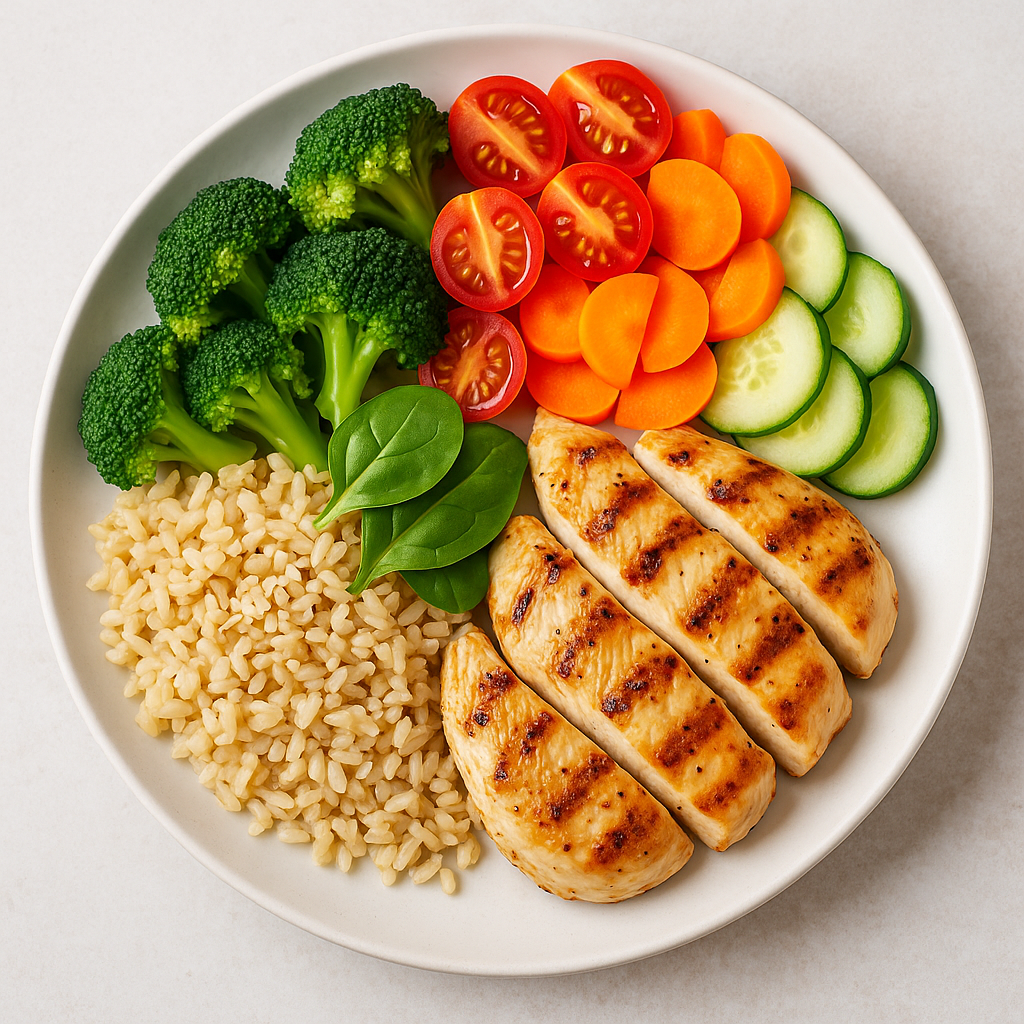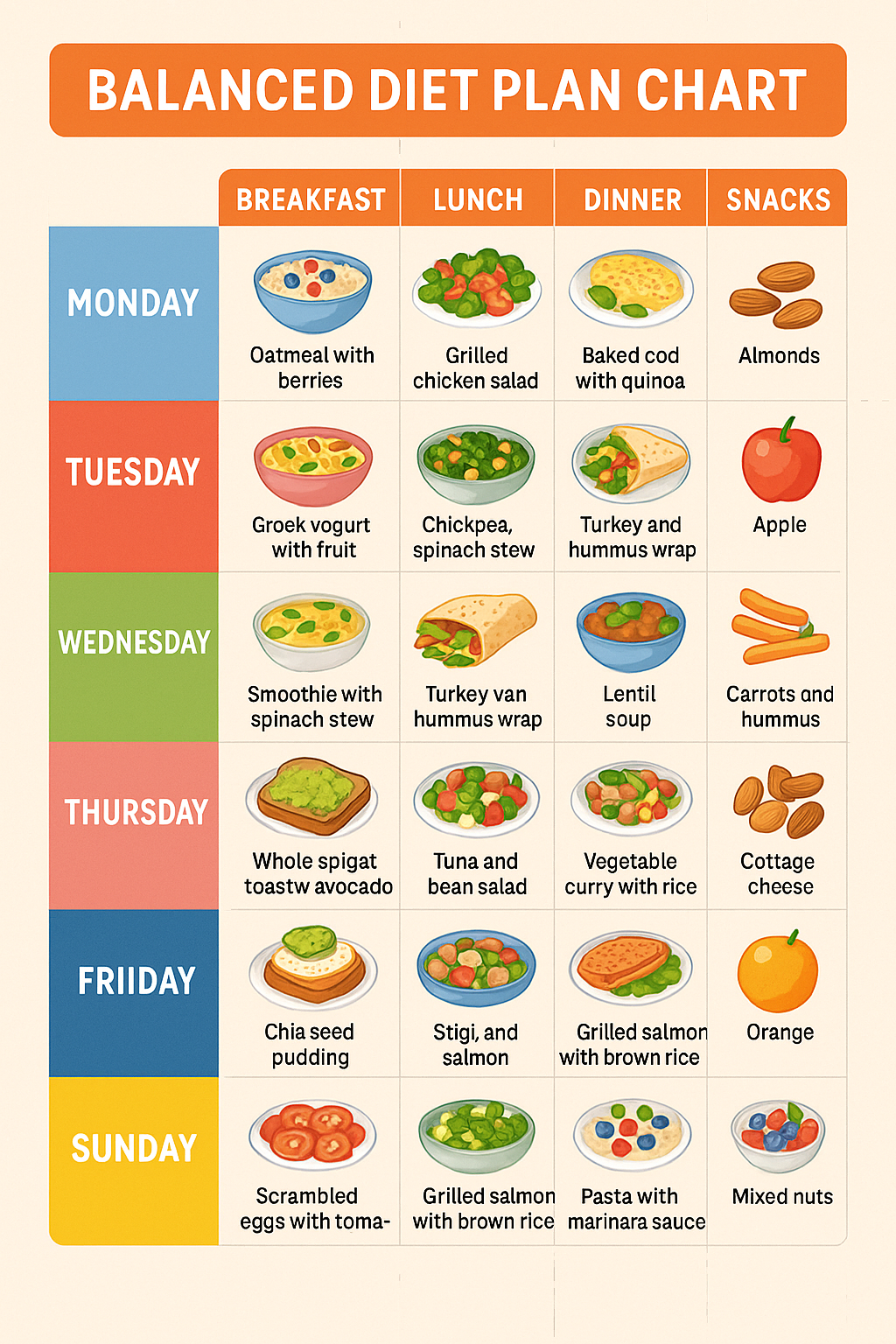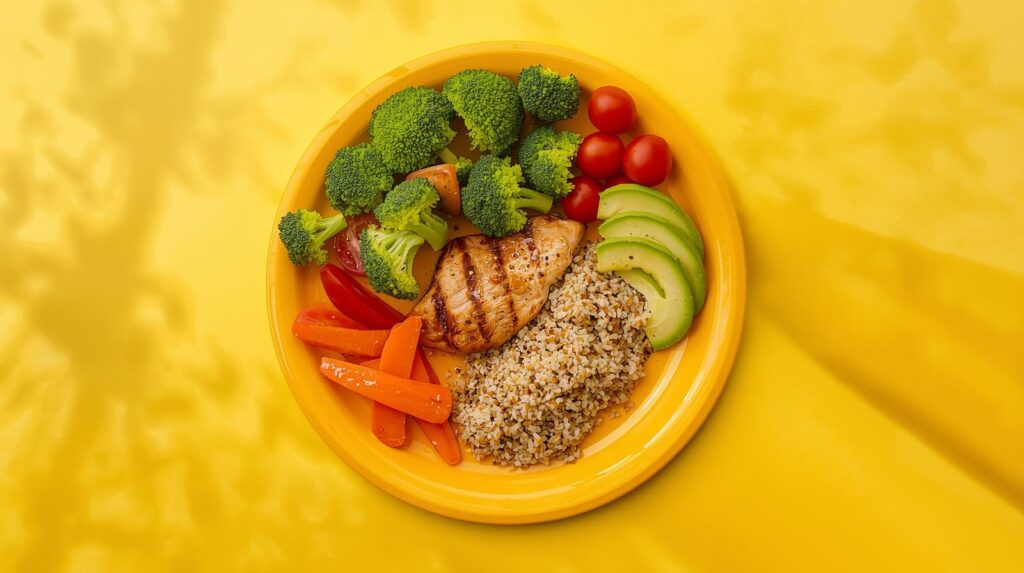The Ultimate Guide to Balanced Diet: What to Eat for Energy, Fitness & Longevity
A balanced diet is the foundation of energy, strength, and long life. The food we eat not only fuels the body but also impacts how we feel, think, and move. Eating right can help you stay energetic throughout the day, improve your fitness levels, and reduce the risk of chronic diseases. With so many diet trends and conflicting advice, it can be confusing to know what truly works. That is why a balanced diet guide backed by science and practical nutrition guidelines is essential.
In this ultimate guide, we will explore what a balanced diet really means, the role it plays in energy and fitness, and how you can create your own balanced diet plan for long-term health and longevity. We will also provide examples of balanced diet plans for energy, weight loss, pregnancy, and vegetarian needs, along with tips on food choices, energy-boosting drinks, and even smart snack options like energy bars.
If you are looking for practical ways to eat better, this article is your healthy diet guide to transform your lifestyle.

What is a Balanced Diet?
A balanced diet means consuming the right amounts of all essential nutrients—carbohydrates, proteins, fats, vitamins, and minerals—without overindulging in any one category. It is not about cutting out food groups but about eating in correct proportions.
According to balanced nutrition guidelines, a proper diet should include:
- Carbohydrates (45–55%): Whole grains, vegetables, fruits
- Proteins (20–25%): Lean meats, legumes, nuts, dairy
- Healthy fats (20–30%): Olive oil, avocado, fatty fish
- Vitamins and minerals: Fresh fruits, vegetables, seeds
- Water: At least 8–10 glasses daily
Following healthy diet guidelines ensures that the body gets the right fuel for daily activity, cell repair, and immune function.
Why Balanced Diet is Important for Energy and Fitness
Many people struggle with low energy and fatigue, not realizing their diet plays the biggest role. A healthy diet for energy ensures your body has the right glucose balance, steady insulin response, and long-lasting fuel reserves.
Here’s how a good diet for energy helps:
- Sustained energy release: Balanced meals with complex carbs prevent sugar crashes.
- Improved metabolism: Proteins and fibers enhance digestion and calorie burning.
- Better fitness performance: A healthy diet for high energy improves stamina for workouts.
- Longevity: Nutritious eating reduces risk of heart disease, diabetes, and obesity.
In fact, research shows that individuals following a balanced diet for energy report higher productivity, better focus, and greater endurance compared to those on restrictive diets.
Components of a Balanced Meal for Energy
Complex Carbohydrates
- Brown rice, oats, quinoa, whole wheat
- Provide long-lasting energy
Lean Proteins
- Eggs, chicken, fish, tofu, beans
- Build and repair muscles
Healthy Fats
- Nuts, seeds, avocado, olive oil
- Support hormone balance and brain health
Vitamins and Minerals
- Fruits like oranges, berries, bananas
- Vegetables like spinach, kale, broccoli
Hydration
- Water, herbal teas, coconut water
A simple balanced meal guide would include half a plate of vegetables, a quarter of lean protein, and a quarter of whole grains, along with a small serving of healthy fat.

Balanced Diet Guidelines for Different Needs
Not everyone has the same nutritional needs. A teenager, an athlete, and a pregnant woman require different diet plans. Following balanced diet guidelines means adjusting based on lifestyle, age, and health goals.
- For students or office workers: Focus on steady energy foods such as oats, whole grains, and nuts.
- For athletes: Emphasize proteins, high-energy carbs, and hydration.
- For elderly: More calcium, vitamin D, and light proteins.
- For pregnant women: Higher intake of folic acid, iron, and omega-3 fatty acids.
By using these healthy diet guidelines, you can make food choices that match your body’s unique needs.
Sample Balanced Diet Plans
Balanced Diet Plan for Weight Loss
Breakfast: Oatmeal with nuts and berries
Lunch: Grilled chicken salad with olive oil
Snack: An apple with peanut butter
Dinner: Steamed fish with quinoa and vegetables
Balanced Diet Plan for Weight Gain
Breakfast: Smoothie with milk, bananas, oats, and nut butter
Lunch: Lentil curry with rice and avocado
Snack: Trail mix or homemade good diet energy bar
Dinner: Pasta with lean meat and olive oil
Balanced Diet Plan for Pregnancy
Breakfast: Whole wheat toast with boiled eggs
Lunch: Salmon with brown rice and spinach
Snack: Yogurt with chia seeds
Dinner: Chicken soup with vegetables and quinoa
Balanced Diet Plan for Vegetarians
Breakfast: Almond milk smoothie with spinach and banana
Lunch: Lentils with brown rice and salad
Snack: Roasted chickpeas
Dinner: Paneer with whole wheat roti and vegetables
Balanced Diet Plan Indian
Breakfast: Idli or poha with chutney
Lunch: Dal with roti and vegetable curry
Snack: Buttermilk and nuts
Dinner: Rice with fish curry or vegetable korma
Balanced Diet Plan for a Week (Chart Example)
| Day | Breakfast | Lunch | Snack | Dinner |
|---|---|---|---|---|
| Mon | Oatmeal with fruit | Chicken salad | Nuts | Brown rice with lentils |
| Tue | Smoothie with banana | Fish with vegetables | Yogurt | Quinoa with beans |
| Wed | Whole wheat toast with eggs | Grilled paneer with salad | Fruit | Rice with curry |
| Thu | Idli with chutney | Lentil soup | Energy bar | Pasta with veggies |
| Fri | Boiled eggs with avocado | Chicken wrap | Trail mix | Fish curry |
| Sat | Poha with peanuts | Grilled tofu | Roasted chickpeas | Rice and vegetables |
| Sun | Pancakes with berries | Salmon with spinach | Nuts | Brown rice with lentils |
Energy-Boosting Foods and Drinks
Good Diet Energy Bar
Homemade energy bars made from oats, nuts, honey, and dates are a great good diet energy bar option. They provide quick fuel without refined sugar.
Healthy Diet Energy Drinks
Skip sugary sodas and instead choose healthy diet energy drinks like:
- Coconut water
- Herbal teas
- Green smoothies
- Fresh fruit juices
These drinks support hydration and provide natural electrolytes, unlike artificial energy boosters.
Balanced Diet for Longevity
Long life is tied directly to what you eat. Research on Blue Zones—areas where people live longest—shows diets high in plants, whole grains, and lean proteins. Following a balanced diet plan reduces risk of heart disease, diabetes, and cancers.
The balanced diet energy content from plant-based foods is particularly important for aging well. Longevity is not about eating less, but about eating right.
Practical Tips to Maintain a Balanced Diet
- Follow a balanced meal guide at every meal.
- Meal prep for the week using a balanced diet plan chart.
- Stay hydrated with water and healthy drinks.
- Avoid processed foods and excess sugar.
- Use resources like NutriFitCalc to calculate your daily nutritional needs.
Helpful resources: WHO – Healthy Diet, Harvard Health – Healthy Eating
Conclusion
Eating a balanced diet is not about strict rules but about smart choices. By following balanced nutrition guidelines, you can enjoy foods that give you lasting energy, improve fitness, and support long life. Whether you want to lose weight, gain weight, or simply stay healthy, a balanced diet plan is your roadmap.
From balanced meals for energy to specialized plans like balanced diet for pregnancy or vegetarian diet plans, this guide has covered it all. Start small, stay consistent, and use tools like NutriFitCalc to track your progress.
Health, energy, fitness, and longevity all begin on your plate. Make the change today, and fuel your body with a diet that truly works.
Trusted Health Resources
FAQs
What does a balanced diet include for energy and fitness?
A balanced diet includes lean protein, whole grains, fruits, vegetables, healthy fats, and enough water. These nourish your muscles, support recovery, and fuel workouts.
How does a balanced diet support longevity?
Foods rich in antioxidants, fiber, and healthy fats reduce inflammation, help prevent chronic disease, and support body repair — key for living longer in better health.
How many meals a day should I eat to maintain energy levels?
Aim for 3 main meals and 1-2 snacks. Include protein and good carbs each time to avoid energy crashes and support metabolism.
Can I reach fitness goals with a balanced diet alone?
A balanced diet is essential, but pairing it with regular exercise boosts results. Fitness comes from both the food you eat and the effort you make.
How do I adjust a balanced diet based on age or activity level?
Increase protein if you exercise heavily or are older. Adjust calorie intake based on how much you move. Choose nutrient-dense foods over empty calories.
⚠️ Disclaimer
This guide is for general information only. It does not replace medical, nutrition, or fitness advice from professionals. Always consult a qualified healthcare provider before starting a new diet or fitness regimen, especially if you have existing health conditions.
